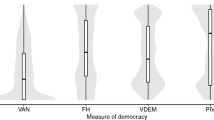Abstract
In this brush-clearing paper, we demonstrate that there is a deficit both of democracy and of freedom in Muslim-majority countries by comparison with the rest of the world. We further demonstrate that these deficits are not fully explained by poverty or by oil but seem to have something to do with Islam itself. We further demonstrate that the democracy and freedom deficits are larger in the Islamic heartland than elsewhere in Muslim-majority countries. We show that the democracy deficit is not driven by demands for autocracy in Muslim-majority countries, and indeed, that individual Muslims value democracy more than non-Muslims. We suggest that the lack of religious freedom in Muslim-majority countries (the supreme power concept) may be a significant variable in explaining the democracy deficit.
Similar content being viewed by others
References
Alesina, A., Devleeschauwer, A., Easterly, W., Kurlat, S., & Wacziarg, R. (2003). Fractionalization. Journal of Economic Growth, 8, 2.
Armstrong, K. (2002). Islam: a short history. New York: The Modern Library.
Barro, R. (1999). Determinants of democracy. Journal of Political Economy, 107(6), S158–S183.
Bernholz, P. (2006). International political system: supreme values and terrorism. Public Choice, 128(1–2), 221–231.
Bratton, M. (2003). Briefing: Islam, democracy, and public opinion in Africa. African Affairs (2003), 102, 493–501.
Feldman, N. (2003). After Jihad: America and the struggle for freedom and democracy. New York: Farrar, Straus and Giroux.
Hillman, A. (2007). Economic and security consequences of supreme values. Public Choice, 131(3–4), 259–280.
Huntington, S. P. (1993). The clash of civilizations? Foreign Affairs, 72(3), 22–49.
Huntington, S. P. (1996). The clash of civilizations and the remaking of world order. New York.
Iannaccone, L. R. (1998). Introduction to the economics of religion. Journal of Economic Literature, 36(3), 1465–1495.
Iannaccone, L. R. Berman, E. (2006). Religious extremism: The good, the bad, and the deadly. Public Choice, 128(1–2), 109–129.
Inglehart, R., & Norris, P. (2001). The true clash of civilizations. Foreign Policy, 135, 62–70.
Jamal, A., & Tessler, M. (2008). The Democracy barometers: attitudes in the Arab world. The Journal of Democracy, 19, 1.
Karatnycky, A. (2002). Muslim countries and the democracy gap. Journal of Democracy, 13(1), 99–112.
Kuran, T. (1995). Private truths, public lies: the social consequences of preference falsification. Cambridge: Harvard University Press.
Melia, T. O. (2003). What Muslims want: in Afghanistan and elsewhere—Democracy. HeinOnline-4 Georgetown Journal of International Affairs, 155.
Midlarsky, M. I. (1998). Democracy and Islam: implications for civilizational conflict and the democratic peace. International Studies Quarterly, 42, 485–511.
Munger, M. (2006). Preference modification vs. incentive manipulation as tools of terrorist recruitment: The role of culture. Public Choice, 128(1–2), 131–146.
Przeworski, A. (2002). Democracy and economic development. In E. D. Mansfield & R. Sisson (Eds.), Political science and the public interest (pp. 1–27). Columbus: Columbus Ohio State University Press.
Ross, M. L. (2001). Does oil hinder democracy? World Politics, 53, 325–361.
Rose, R. (2002). How Muslims view democracy. Journal of Democracy, 13(4).
Rowley, C. K. (2000). Political culture economic performance in sub-Saharan Africa. European Journal of Political Economy, 16, 133–158.
Rowley, C. K. (2004). Conservatism and economics: A sweet Turkish delight. Public Choice, 119(1–2), 1–12.
Rowley, C. K., & Dobra, M. (2003). The glorious revolution of 1688: successful constitutional and institutional adjustment in a period of rapid change. In R. Mudambi, P. Navarra, & G. Sobbrio (Eds.), Economic welfare, international business and global institutional change (pp. 264–293). Cheltenham Northampton: Edward Elgar.
Shughart, W. F. (2006). An analytical history of terrorism 1945–2000. Public Choice, 128(1–2), 7–39.
Wintrobe, R. (1998). The political economy of dictatorship. Cambridge: Cambridge University Press.
www.freedom_house.org./template.cfm?page=351&ana_page=333&year=2007.
Author information
Authors and Affiliations
Corresponding author
Rights and permissions
About this article
Cite this article
Rowley, C.K., Smith, N. Islam’s democracy paradox: Muslims claim to like democracy, so why do they have so little?. Public Choice 139, 273–299 (2009). https://doi.org/10.1007/s11127-008-9393-8
Received:
Accepted:
Published:
Issue Date:
DOI: https://doi.org/10.1007/s11127-008-9393-8



